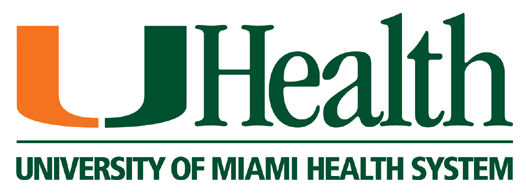Tag Archives: Liver Cancer
Dr. Thomas has received a $2 million dollar grant from the FL Department of Health to study virus infection and progression of liver disease to liver cancer.
The Florida Department of Health has awarded Dr. Thomas the Bankhead-Coley Florida Clinical Cancer Research Grant to lead a research project titled “Identifying Infection and Molecular Determinants of Health Disparities in HCV Infected Minority Populations for the Prevention of HCC”. The project is designed to address health disparities in minority populations with HCV-attributable liver disease in order to increase the early detection of HCC. The study aims to aid in the detection of high-risk subgroups and improve understanding of the progression of HCV disease after infection.


Dr. Thomas has received a $2 million dollar grant from the NIH to study acute & chronic viral infections.
The NIH funded project titled “A Multifaceted Approach to Study Tissue and Cell Type Specific Molecular Mechanisms of the Host Response to Acute/ Chronic Viral Infection” is lead by Dr. Thomas and awarded to the University of Miami School of Medicine. The project is intended to elucidate the tissue specific molecular mechanisms that drive disease progression in patients with chronic viral infections, as these patients are susceptible to high morbidity and mortality rates due to progressive organ damage. The project findings would subsequently be used to identify new targets for therapeutic intervention.
Very few viruses are able to manifest as chronic infections in humans. The intrinsic innate immune response provides a first line of defense against invading viruses; however, in the case of chronic viral infections, these initial responses that were ineffective at controlling virus replication can then cause disease over many years due to chronic activation. In most organs, epithelial cells are some of the first cells to encounter viruses in the human body and innate immune responses in these cells are paramount to driving subsequent immune control. Interestingly, epithelial cells predominantly produce type III interferons (IFNs) in response to viral infection whereas immune cells produce Type II IFNs (γ) and Type I IFNs (α/β) are produced by most cells in the body. The mechanism underlying cell type and tissue specific expression of the type III IFNs are unknown and likely involve regulation of epigenetics modifications, gene expression of pattern recognition receptors and associated signaling molecules. In drosophila, the fat body is the primary innate immune organ producing antimicrobial peptides in response to pathogens. The human liver, equivalent to the drosophila fat body in terms of function, utilizes Type III IFN responses to fight viral infection and likely possesses other unique properties with respect to innate immunity when compared to other organs.
We have developed novel and exciting in vitro models that utilize primary epithelial cells from several organs that have intact innate immune responses when compared to immortalized or transformed cell lines. We and others have shown that these cell types are of critical importance in the development of disease since they directly detect components of viral pathogens. We therefore assert that primary cells are the optimal model to use for studies on innate immunity and we propose a novel approach to study innate immunity based on the innate immune pathways that we have demonstrated to be important for microbial pathogenesis. In addition, we are developing novel physiologic models incorporating primary epithelial cells, stem cell-derived epithelial cells, 3-dimensional chip and microfluidic-based platforms.
The use of stem cell-derived cells would facilitate the identification of changes in gene expression, which occur during differentiation, that contribute to the unique innate immune system in epithelial cells. The specific goals of this program are to functionally characterize the innate immune response, including the production of Type III IFNs, to multiple viral pathogen associated patterns, including both DNA and RNA sensing pathways, and to elucidate the underlying molecular mechanisms through which innate immunity manifests in epithelial cells using sophisticated in vitro models. In addition, tissue specific and developmental expression of specific innate immune signaling components including, TLR3, STING and IRF7, will be addressed as a mechanism underlying tissue specific responses. Completion of these studies would offer the most in depth characterization of innate immunity in epithelial and other cell- types while improving our understanding of its contribution to human disease in multiple organs.


Dr. Thomas Receives Travel Award to HIV and Liver Disease meeting 2016.
Liver disease has emerged as a major cause of morbidity and mortality in individuals infected with HIV, including those infected with HBV and HCV. The HIV & Liver Disease 2016 conference is designed to address the increasingly prevalent clinical issues and challenges associated with HIV and liver disease,
U.Miami School of Medicine Awarded $2.5 Million Dollar NIH Award with Emmanuel Thomas, M.D., Ph.D. to help South Florida Community.
A team of Miller school specialists including Emmanuel Thomas, M.D., Ph.D., assistant professor of the Sylvester Comprehensive Cancer Center and the Schiff Center for Liver Diseases and Miami CTSI KL2 Scholar, Daniel Sussman, associate professor of clinical medicine in the Division of Gastroenterology, and Sonjia Kenya, Ed.D., M.S., M.A., assistant research professor of medicine, Director of Community Health Programs at Sylvester’s Jay Weiss Institute for Health Equity, and Education and Research Officer at the Miller School’s Office of Diversity and Multiculturalism, have developed the multi-modal strategy for the early detection and prevention of four health priority conditions: Hepatitis C Virus (HCV), colorectal cancer, Human Immunodeficiency Virus (HIV) and cervical cancer.
Schiff Center for Liver Disease Wins Award.
Dr. Schiff, Leonard Miller Professor of Medicine, Dr. Nasser Ibrahim Al-Rashid chair in the Division of Hepatology, the director of the Schiff Center for Liver Diseases, and the director of the Hepatology Research Laboratory at the Miller School of Medicine, received the Distinguished Faculty Scholar Award, presented by Emmanuel Thomas, M.D., Ph.D., an assistant professor at Sylvester Comprehensive Cancer Center.











